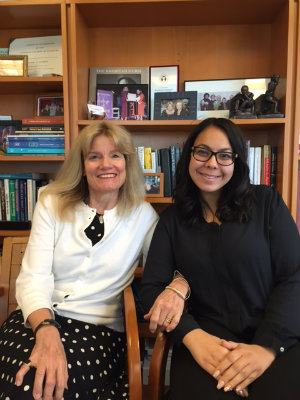 JAHF President Terry Fulmer, left, showed Kathrin Lozah the connection between passion and innovation during Lozah's six-month internship.
JAHF President Terry Fulmer, left, showed Kathrin Lozah the connection between passion and innovation during Lozah's six-month internship.Working in a setting that has a diverse group of people with differing backgrounds, education, and experiences who are passionate about what they do creates the ideal habitat for innovation. That is something I learned very quickly in my time working as an intern at The John A. Hartford Foundation over the past six months.
The variety in the skill set of the JAHF staff creates the perfect environment for developing multidisciplinary teams, fostering partnerships, and improving overall creative potential. Degrees and education among the staff members vary significantly, ranging from RNs to MPAs, PhDs to MPHs, and many more.
At Northeastern University, where I am an undergraduate student in the Bouvé College of Health Sciences, experiential learning is a cornerstone of education that utilizes the co-operative learning model (co-op) to enrich the academic experience in a practical, yet innovative, approach.
Perhaps the finest example of innovation I have seen at The John A. Hartford Foundation comes directly from its President, Terry Fulmer, PhD, RN, FAAN. Dr. Fulmer is a registered nurse by training, but more than that she is an educator, humanitarian, patient advocate, researcher, and leading expert in the field of elder abuse and mistreatment. She constantly pushes boundaries in the way we look at aging and health care, and her passion for nursing and patient care is palpable.
Always trying to improve nursing care for elderly patients, Dr. Fulmer left her mark on the geriatric nursing community by leading the development of the Geriatric Resource Nurse program and improving geriatric care training for registered nurses. She also worked to develop the Elder Assessment Instrument, which has become one of the most common medical checklists in the United States for examining elderly patients. She continued to break the mold by serving as the first nurse on the board of the American Geriatrics Society (AGS) and as the first nurse to serve as president of the Gerontological Society of America (GSA).
Innovation is a direct result of passion.
All of her success in the field of nursing and elder care stems from her dedication to geriatrics and geronotology. Working with and observing Dr. Fulmer taught me one of the most important lessons in my time at the Foundation: Innovation is a direct result of passion.
Being truly invested in what you do and having constant motivation for your field of work is ultimately what will produce positive outcomes and make things happen. Witnessing firsthand the fervor and zeal of the staff at The John A. Hartford Foundation, it was clear to me that where there is a will, there is most certainly a way.
Using this wealth and breadth of knowledge and experience, the staff at The John A. Hartford Foundation extends their innovative capacity to their grantmaking. The Foundation has awarded more than $500 million in grants since the 1980s, including a recent $3.5 million grant that supports the spread of six highly innovative national models of end-of-life and serious illness care. It also funds the creation of a collective strategy among innovators with shared goals, common metrics, and mutually reinforcing field-building activities. Of the approximately 2.5 million Americans who die annually, 73 percent are over the age of 65. A gap exists between the kind of care older adults want and the medical treatment they receive, creating a pressing need for this collective.
Experts like Dr. Peter Senge, author of The Fifth Discipline Fieldbook, suggest that innovation is a process that brings creativity to measurable outcomes, actions, products, or processes. The John A. Hartford Foundation is a superb example of the power of innovation in producing favorable outcomes.
Stepping into The John A. Hartford Foundation for the first time, I was not sure what to expect. As an undergraduate co-op student embarking on my first foray into the professional world of health care, I was brimming with excitement, but also slightly tentative, wondering where I would fit into this unique foundation.
Six months later, I have approached the end of my time here and I have emerged a confident young leader and advocate for older adults, filled with more knowledge than I could have ever imagined, including some valuable lessons on innovation.
